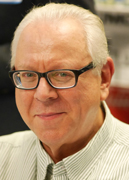PROBLEM WITH THIS WEBPAGE?
Report an accessibility problem
To report another problem, please contact andrew.goldstein@marquette.edu.
 Dr. Steven R. GoldzwigMarquette University
Dr. Steven R. GoldzwigMarquette UniversityLocated Off Campus
MilwaukeeWI53201United States of Americasteven.goldzwig@marquette.eduCurriculum VitaePh.D., Purdue University 1985
M.A., Purdue University 1982
B.A., University of Central Florida 1978
CMST 2310 Argument in Contemporary Society
CMST 3300 Persuasion
CMST 4360 Rhetoric of Social Movements
COMM 6200 Rhetorical Criticism
COMM 6250 Ethics in Communication
Political Communication
Communication & the Presidency
Cultural Values and Ethics
National Communication Association
Central States Communication Association
Rhetoric and Democracy in a Post-Truth Era (co-authored with Joshua Frye) (2024). Lanham: MD: Lexington Books. 2024
Goldzwig, Steven (2008). Truman’s whistle-stop campaign, College Station:Library of Presidential Rhetoric. Texas A & M University Press.
Goldzwig, Steven and Sullivan, P., eds. (2004). New approaches to rhetoric. Beverly Hills: Sage Publications.
Goldzwig, Steven and Dionisopoulos, G. (1995). ‘In a perilous hour’: The public address of John F. Kennedy. Westport, Conn.: Greenwood Press.
“The Rhetoric of Prophetic Dualism: Crisis, American Exceptionalism, and Religious Nationalism in Truman’s St. Patrick’s Day Addresses, March 17, 1948” (with Denise M. Bostdorff, College of Wooster) Journal for the History of Rhetoric (2025) 28 (1): 1–48. https://doi.org/10.5325/jhistrhetoric.28.1.0001 (Lead Article)
“Barack Obama’s Eulogy for the Reverend Clementa Pinckney, June 26, 2015: Grace as the Vehicle for Collective Salvation and Obama’s Agency on Civil Rights” (with Denise M. Bostdorff, College of Wooster) Rhetoric & Public Affairs Vol. 23, No. 1, 2020, pp. 107-152.
Goldzwig, S.R. (2017, May 11). “When Words Lose their Meaning: Counterfactual Advocacy, Donald Trump, and the Rise of Despotic Populism,” Online Publication. Current Commentary, National Communication Association, Communication Currents. Access: https://www.natcom.org/communication-currents/when-words-lose-their-meaning-counterfactual-advocacy-donald-trump-and-rise
S. R. (2013). “The U.S. Catholic Bishops, ‘Religious Freedom,’ and the 2012 Election Campaign: A Reflection.” Rhetoric & Public Affairs 16: 369-383.
Goldzwig, Steven, (2009-2010). Commencing the rationale for war: George W. Bush’s address at West Point, June 1, 2002. Journal for theStudy of Peace & Conflict, 53-76.
Goldzwig, Steven (2006). Demagoguery, democratic dissent, and ‘re-visioning’ democracy.” Rhetoric & Public Affairs 9, 471-478.
Goldzwig, Steven and Bostdorff, D. (2005). History, collective memory, and the appropriation of Martin Luther King, Jr.: Reagan’s rhetorical legacy. Presidential Studies Quarterly, 35, 661-690.
“The Rhetorical Antecedents to Vietnam, 1945-1965” (with Gregory A. Olson & George N. Dionisopoulos). [pp. 303-363]. In Martin J. Medhurst (ed.) A Rhetorical History of the United States: Significant Moments in American Public Discourse, Vol. VIII. East Lansing: Michigan State University Press, 2018.
Goldzwig, Steven and Kassop, Nancy (2013). President Obama and counterterrorism policy: When campaign pressures meet governing imperatives. In Julia R. Azari, Lara M. Brown, & Zim G. Nwokora (Eds.) The presidential leadership dilemma: Between the constitution and a political party (pp. 185-211). Albany, NY: SUNY Press.
Goldzwig, Steven and Sullivan, Patricia A. (2013). Contesting the so-called post-racial landscape of presidential politics: Obama, African Americans, and a shifting electorate. In Clarke Rountree, Venomous speech: Problems with American Political Discourse on the Right and Left. Volume 1 (pp.75-92). Santa Barbara, CA: Praeger.
Goldzwig, Steven and Sullivan, P.A. (2011). Political communication ethics: Postmodern opportunities and challenges. In G. Cheney, et al, Handbook of communication ethics (pp.293-308). International Communication Association, Lawrence Erlbaum Publishers.
Goldzwig, Steven (2008). Report of the national task force on the ethical responsibilities of presidential rhetoric. In J.A Aune and M.J Medhurst (Eds.) The prospect of presidential rhetoric (pp. 317-339). College Station: Texas A & M University Press.
Goldzwig, Steven (2005). Inaugurating the second reconstruction: President Harry S. Truman’s committee on civil rights. In J.A. Aune & E.D. Rigsby (Eds.) Civil rights and the American presidency (pp. 83-113). College Station: Texas A & M University Press.
Goldzwig, Steven (2005). John F. Kennedy (rev. for Theodore O. Windt) in B.K. Duffy and Richard W. Leeman (Eds.) American voices: An encyclopedia of contemporary orators (pp. 231-237). Westport, CT: Greenwood Press.
Goldzwig, Steven and Sullivan, P. (2005). Robert F. Kennedy. In B.K. Duffy and R.W. Leeman (Eds.) American voices: An encyclopedia of contemporary orators (pp. 238-247). Westport CT: Greenwood Press.
Goldzwig, Steven and Sullivan, P. (2005). Ralph W. Nader. In B.K. Duffy and R.W. Leeman (Eds.) American voices: An encyclopedia of contemporary orators (pp. 330-338). Westport, CT: Greenwood Press.
Goldzwig, Steven (2005). Official and unofficial civil religious discourse. Rpt. in Roderick Hart and John L. Pauley II, The political pulpit revisited (pp. 161-168). West Lafayette, Indiana: Purdue University Press.
Goldzwig, S. R. (2016). Book Review. Harry Truman and the Struggle for Racial Justice [by R. Shogan]. Presidential Studies Quarterly, 46/3, 739-740.
Goldzwig, S. R. (2016). Book Review. Making JFK Matter: Popular Memory and the Thirty-fifth President [by P. H. Santa Cruz]. Presidential Studies Quarterly, 46/1, 224-225.
I appreciate the openness to new ideas that Marquette students display. When challenged, most students respond to the call. I really believe that students at Marquette value learning and that they are vitally interested in the important social dialogues occurring in contemporary society. I see my role as one of facilitating those interests further and guiding students to probe their world in a more critical and analytic fashion.